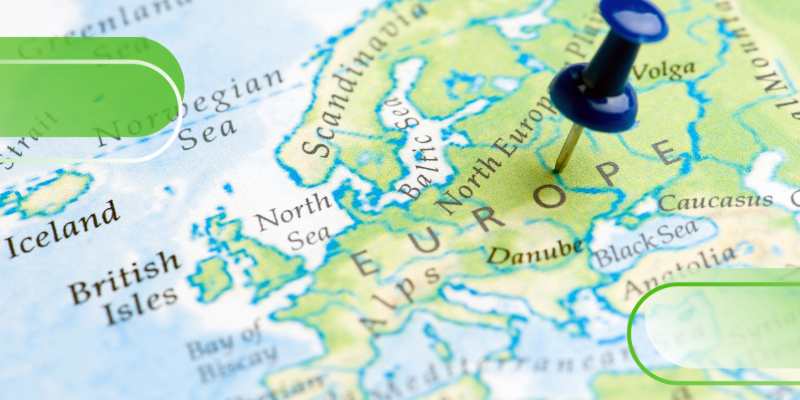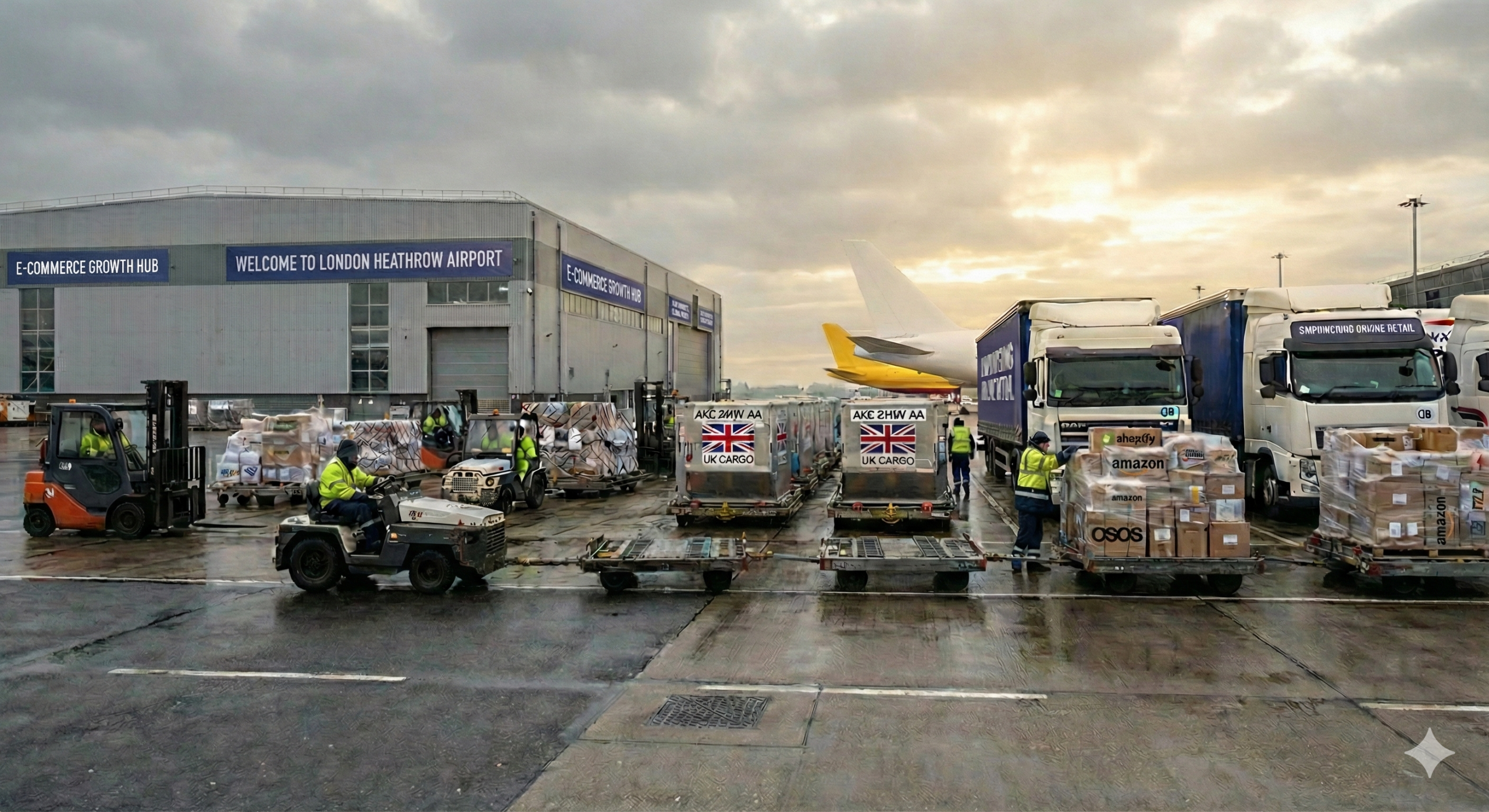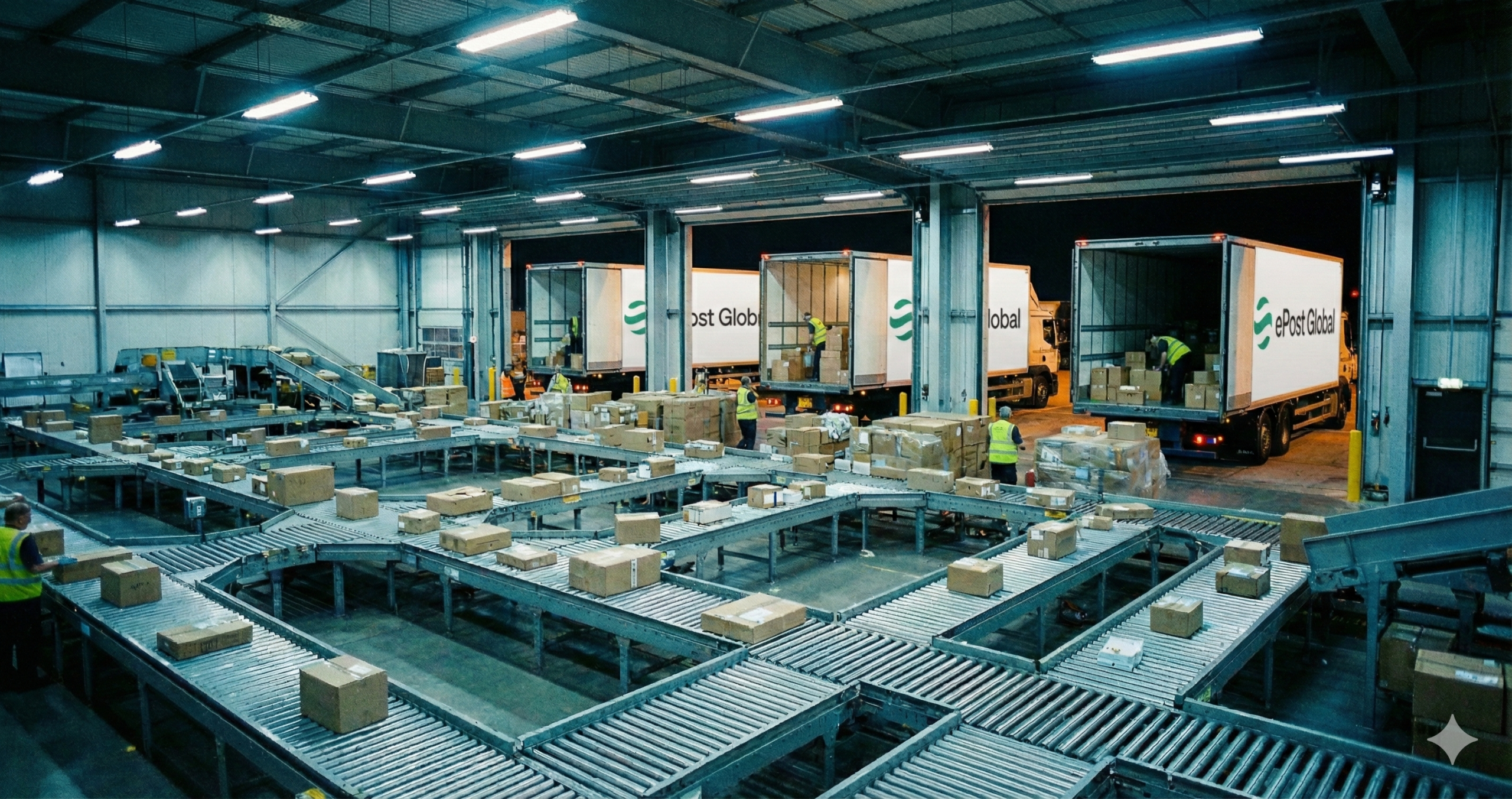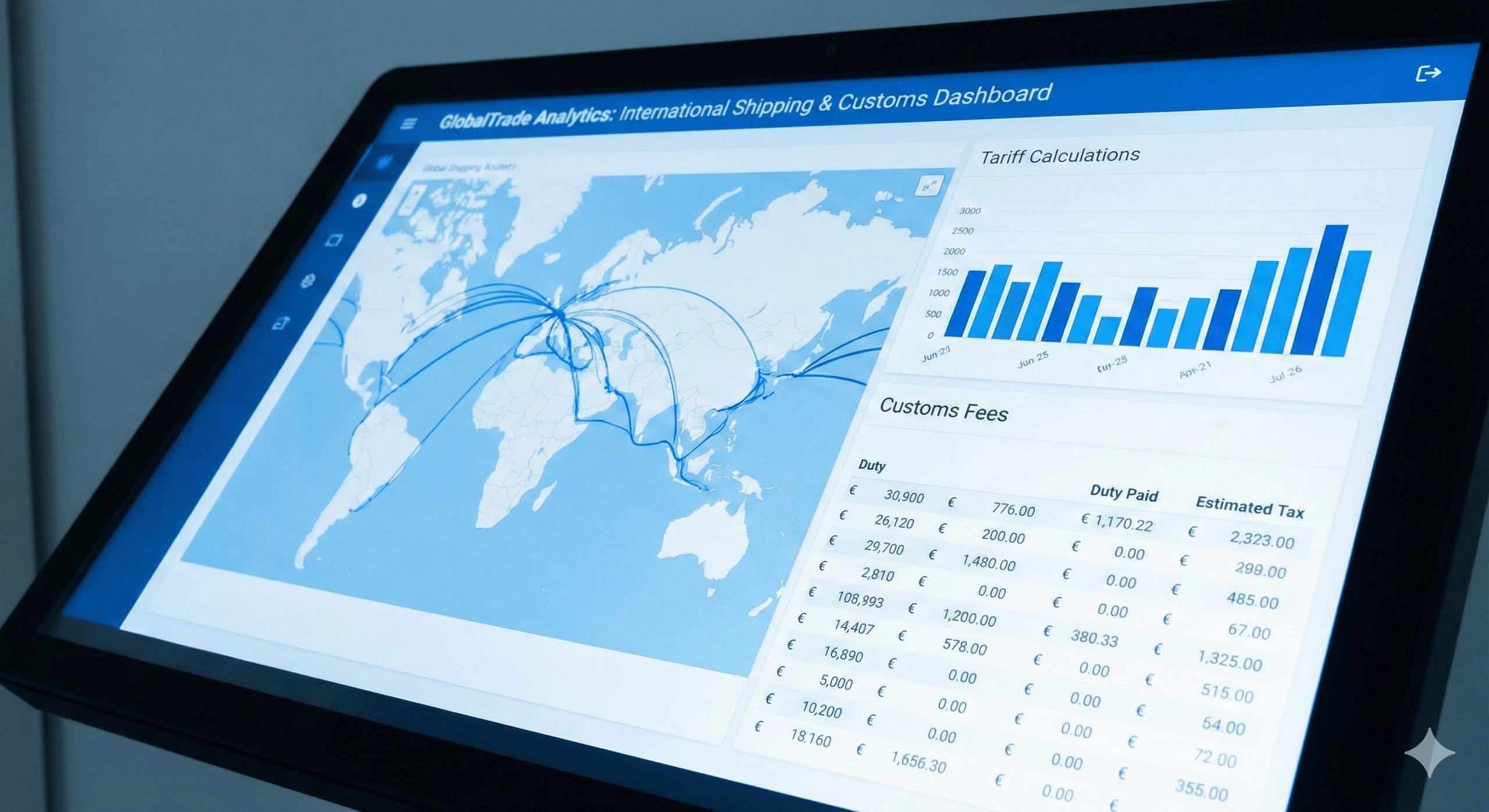While many businesses focus on the cheapest shipping options and the fastest delivery times, many people overlook compliance when it comes to shipping services. For international shipments, especially, shippers must ensure their products and processes meet regulatory requirements to avoid delays, fines, or rejected shipments.
When expanding your eCommerce business into Europe, navigating the maze of country-specific regulations is crucial for success. Selling to European consumers isn’t as simple as setting up international shipping. While the European Union (EU) provides overarching guidelines that streamline trade across member states, each country has its own unique rules and requirements that can complicate compliance.
From strict packaging laws in Germany to France’s repairability index to Belgium’s CO2 tracking mandates, U.S. brands need to stay informed to avoid regulatory pitfalls. This cheat sheet highlights the key compliance points for all 27 EU countries, helping you streamline your operations, protect your brand reputation, and avoid costly mistakes.
Overarching EU Guidelines
Before diving into each specific country, companies need to understand the overarching standards that apply to most countries in the EU. These rules aim to create a unified market, but compliance requires careful attention to detail across several key areas:
Shipping Standards
To meet the expectations of EU consumers and adhere to regulations, businesses must ensure transparency and precision in their shipping operations.
- Customs declarations. All goods entering the EU must include accurate customs forms and declarations detailing product descriptions, Harmonized System (HS) codes, and value.
- VAT compliance. The EU requires sellers to collect and remit value-added tax (VAT) based on the destination country’s tax rate. For shipments under €150, businesses can use the Import One-Stop Shop (IOSS) to simplify VAT collection. For shipments above this threshold, businesses must either register for VAT in the destination country or use the One Stop Shop (OSS) for intra-EU B2C sales.
- Delivery timelines. Transparency in shipping timelines is essential. EU consumers expect clear delivery estimates and tracking options for cross-border purchases.
Packaging Requirements
Sustainability and clear communication are at the forefront of EU packaging standards, pushing retailers to adopt practices that minimize waste and improve accountability.
- EU Packaging Waste Directive. The EU Packaging Waste Directive mandates recyclable or minimal packaging materials, with penalties for excessive packaging or nonrecyclable plastics. In addition, Extended Producer Responsibility (EPR) regulations require businesses to register and pay fees based on the volume of packaging they introduce into certain EU markets, such as France and Germany. By 2025, the Corporate Sustainability Reporting Directive (CSRD) will further require detailed disclosures on environmental impact for businesses operating in the EU.
- Material labeling. Sellers must disclose the composition of their packaging materials and provide recycling instructions.
Return Policies
Returns play a crucial role in consumer trust and satisfaction, with EU mandates ensuring that shoppers have access to fair and transparent return processes.
- EU Consumer Rights Directive (CRD). This gives consumers a 14-day period to return most products without providing a reason. Personalized items, perishable goods, and certain hygiene products are exempt from this rule.
- Refunds. Businesses must issue refunds promptly, including the cost of standard shipping for returned goods.
Sustainability Mandates
EU countries are driving initiatives that prioritize the environment, encouraging retailers to integrate sustainability into every aspect of their operations.
- Circular Economy Action Plan. This promotes the repair, recycling, and reuse of products to minimize waste. For instance, retailers are encouraged to repair returned goods rather than discard them.
Digital Compliance
Data privacy and transparency remain central to EU digital regulations, requiring businesses to prioritize secure and responsible digital practices.
- GDPR (General Data Protection Regulation). Businesses must protect customer data and ensure transparency in how personal information is collected, stored, and used.
- Cookies and tracking. Explicit consent is required for tracking cookies and other digital data collection methods.
- E-invoicing standards. Many EU countries now require electronic invoicing for cross-border trade to streamline VAT reporting.
By adhering to these EU-wide standards, U.S. brands can build trust with European consumers, avoid fines, and position themselves for long-term success in the competitive EU market. The following sections will delve into country-specific rules to help you refine your compliance strategy.
Tips for Staying Compliant Across 27 EU Countries
Austria
Austria places a strong emphasis on sustainability and energy efficiency in eCommerce operations. Businesses must adhere strictly to the country’s waste management laws, particularly regarding packaging disposal. Beyond mandatory compliance with the EU Packaging Waste Directive, there is an additional focus on minimizing nonrecyclable materials.
For electronic products, Austria requires energy-efficient labeling to inform consumers about a product’s environmental impact and energy consumption. This not only aligns with Austria’s commitment to reducing its carbon footprint but also appeals to environmentally conscious shoppers. Staying compliant in Austria means prioritizing recyclable packaging, clearly labeling energy usage on electronics, and maintaining transparent, eco-friendly practices.
Learn more about compliance in Austria.
Belgium
Belgium’s eCommerce landscape is shaped by its strong emphasis on sustainability and consumer convenience. Retailers are required to report the carbon footprint of their logistics and returns processes, aligning with the country’s commitment to environmental accountability. This includes tracking emissions from shipping and implementing measures to reduce their environmental impact.
Additionally, Belgium mandates that businesses offer at least two returns methods, providing flexibility for consumers and enhancing the overall shopping experience. To succeed in this market, eCommerce brands must adopt eco-friendly logistics strategies and ensure their return policies meet these dual-method requirements.
Learn more about compliance in Belgium.
Bulgaria
Bulgaria emphasizes language accessibility and customs compliance for eCommerce businesses. All return policies and product instructions must be provided in Bulgarian to ensure transparency and compliance with local consumer protection laws. This requirement helps retailers as much as it does consumers, by helping companies build trust with Bulgarian shoppers and reduce the potential for disputes.
Clear labeling for cross-border shipments is another critical compliance point. Retailers must accurately describe product contents and adhere to customs documentation standards to avoid shipping delays or penalties..
Learn more about compliance in Bulgaria.
Croatia
Croatia places a strong emphasis on consumer education and warranty transparency. Retailers are required to inform consumers about proper recycling and disposal options for purchased goods, ensuring that shoppers are aware of their environmental responsibilities while helping to reduce waste.
Additionally, Croatia enforces clear guidelines for warranty claims, requiring businesses to provide detailed information about warranty periods and conditions.
Learn more about compliance in Croatia.
Cyprus
Cyprus prioritizes shipping transparency and eco-friendly practices in eCommerce. Businesses are required to disclose detailed shipping costs up front, including any potential customs fees or additional charges, ensuring a seamless shopping experience for consumers.
Cyprus has implemented strict limits on single-use plastics in packaging, encouraging retailers to adopt sustainable materials. Compliance with these regulations not only avoids penalties but also appeals to eco-conscious shoppers.
Learn more about compliance in Cyprus.
Czech Republic
The Czech Republic is a leader in simplifying returns and promoting eco-friendly logistics. Consumers in this market benefit from a wide range of return options, including drop-off points and courier pickups, making the process convenient and efficient.
To further support sustainability, the Czech government offers incentives for retailers adopting green logistics solutions. This includes the use of electric vehicles, eco-friendly packaging, and optimized delivery routes. By embracing these practices, businesses can enhance their reputation and comply with local expectations.
Learn more about compliance in the Czech Republic.
Denmark
Denmark’s commitment to sustainability heavily influences its eCommerce regulations. The country enforces green taxation, imposing higher taxes on businesses that fail to meet eco-packaging standards. Retailers must ensure that their packaging materials are not only recyclable but also adhere to stringent environmental guidelines to avoid additional costs.
Additionally, Denmark promotes repair mandates for electronics and appliances, encouraging retailers to offer repair services and spare parts to extend the lifecycle of products. These measures align with Denmark’s focus on reducing waste and supporting a circular economy.
Learn more about compliance in Denmark.
Estonia
Estonia is a digitally forward country, and its eCommerce regulations reflect this modern approach. Retailers are encouraged to offer digital receipts for returns, reducing the reliance on paper and supporting sustainable business practices. This digital-first mindset also aligns with Estonia’s focus on innovation and efficiency.
Language accessibility is another priority. All return policies, product descriptions, and user manuals must be available in Estonian to comply with local consumer protection laws. By adopting these practices, businesses can establish trust with Estonian shoppers and demonstrate a commitment to localized service.
Learn more about compliance in Estonia.
Finland
Finland is a leader in sustainability and eco-conscious business practices. Retailers operating in this market must prioritize the use of sustainable materials in their packaging to comply with the country’s strict environmental standards. Nonrecyclable or excessive packaging can result in penalties and damage a brand’s reputation among Finnish consumers.
In addition, Finland encourages the offering of extended warranties for electronics and other durable goods. This policy aims to reduce waste by promoting product longevity and repairability.
Learn more about compliance in Finland.
France
France is at the forefront of integrating sustainability and consumer protection into its eCommerce regulations. A standout requirement is the repairability index, which mandates that products display a repairability score ranging from 1 to 10. This initiative promotes transparency and encourages consumers to make more-sustainable choices by opting for repairable products.
Noncompliance with France’s return and labeling regulations can result in significant penalties, including fines. To succeed in the French market, businesses must prioritize compliance by adopting transparent return policies, ensuring proper labeling, and integrating repairability standards into their product offerings.
Learn more about compliance in France.
Germany
Germany is a global leader in sustainable eCommerce practices, with strict regulations that emphasize environmental responsibility. VerpackG, the German Packaging Act, applies to all businesses selling or shipping products to Germany—even from abroad. Companies must register with the Central Agency Packaging Register (ZSVR) and report their packaging materials to remain compliant. Noncompliance can result in fines or sales restrictions, though businesses selling limited quantities may be able to meet requirements through an authorized compliance partner.
In addition, Germany encourages eco-friendly returns, pushing retailers to minimize the environmental impact of returned goods by offering refurbishment programs or recycling initiatives..
Learn more about compliance in Germany.
Greece
Businesses selling to customers in Greece must pay close attention to customs declaration compliance, as Greece has some of the strictest clearance procedures in the EU. Delays are common due to frequent inspections, and some product categories, such as electronics and pharmaceuticals, require additional approvals. Ensuring accurate labeling, HS codes, and full documentation can prevent unexpected duties or shipment rejections.
Additionally, Greece requires clear and concise guidelines for returning items. Return transparency is especially critical for cross-border purchases, as it builds trust with consumers and minimizes disputes.
Learn more about compliance in Greece.
Hungary
Hungary emphasizes consumer protection and sustainability in eCommerce. Their recent consumer protection regulations require online retailers to offer the Hungarian Postal Service (MPL) as a delivery option, highlighting the importance of complying with localized eCommerce rules—something U.S. businesses should consider when operating internationally.
The country also enforces strict e-waste recycling regulations, requiring businesses to provide proper disposal options for electronic returns. This aligns with Hungary’s commitment to reducing electronic waste and promoting environmental responsibility.
Learn more about compliance in Hungary.
Ireland
Ireland is committed to promoting sustainability and transparency in eCommerce. Retailers are required to disclose their eco-initiatives, such as sustainable packaging and recycling programs, as part of their business practices.
In addition, Ireland emphasizes consumer awareness, mandating transparent return policies with detailed terms and conditions. These measures help build trust and foster a positive shopping experience for Irish consumers.
Learn more about compliance in Ireland.
Italy
Italy enforces Extended Producer Responsibility (EPR) regulations, holding businesses accountable for the entire lifecycle of their products. This includes ensuring that products are designed for recyclability, repairability, and minimal environmental impact.
In addition, Italy has banned the use of nonrecyclable plastics in eCommerce shipments, requiring businesses to adopt sustainable packaging solutions. Compliance not only meets regulatory requirements but also appeals to Italy’s growing base of eco-conscious consumers.
Learn more about compliance in Italy.
Latvia
Latvia emphasizes the importance of localized communication and digital innovation in eCommerce. To comply with local consumer protection laws, retailers must ensure that all policies, including return and warranty information, are provided in Latvian.
The country also encourages electronic returns, promoting digital-first solutions that simplify the return process for both consumers and businesses. These measures align with Latvia’s commitment to modernizing its eCommerce ecosystem.
Learn more about compliance in Latvia.
Lithuania
Lithuania prioritizes sustainability and consumer transparency in eCommerce. Retailers are required to provide recycling drop-off points for returned products, ensuring responsible disposal and reducing environmental impact.
In addition, all product and packaging labels must include detailed information in Lithuanian. These practices foster trust and demonstrate a commitment to sustainability.
Learn more about compliance in Lithuania.
Luxembourg
Luxembourg offers streamlined procedures for cross-border returns, making it easier for international retailers to manage returns efficiently. This simplifies the consumer experience and supports Luxembourg’s reputation as a hub for cross-border eCommerce.
Additionally, retailers must align with the country’s stringent sustainability standards. Compliance with these standards not only avoids penalties but also strengthens brand credibility in this environmentally conscious market.
Learn more about compliance in Luxembourg.
Malta
Malta is at the forefront of digital innovation in eCommerce. The country provides incentives for businesses using AI in returns management, encouraging the adoption of technology to improve efficiency and reduce costs.
At the same time, Malta enforces strict eco-compliance rules, including a ban on excessive packaging materials. Retailers must prioritize minimal and sustainable packaging to meet these requirements and appeal to eco-conscious consumers.
Learn more about compliance in Malta.
Netherlands
The Netherlands requires retailers to meet high standards for eco-friendly packaging. Businesses are expected to use recyclable or reusable materials, reflecting the country’s strong environmental values.
The Dutch government also promotes a circular economy focus, encouraging repair and reuse over product replacements. Retailers that adopt these practices not only comply with regulations but also resonate with the environmentally aware Dutch consumer base.
Learn more about compliance in the Netherlands.
Poland
Poland emphasizes consumer protections, requiring transparent return policies and clear refund timelines. Retailers must ensure that consumers are well informed about their rights and the processes for returning items, which helps build trust and customer satisfaction.
The country also enforces strict waste management and recycling regulations. Businesses must adopt sustainable practices for packaging and disposal to comply with these standards and appeal to environmentally conscious consumers.
Learn more about compliance in Poland.
Portugal
In Portugal, consumer protection laws ensure that consumers are not burdened with additional costs when returning defective goods. According to the Portuguese Consumer Protection Law, eCommerce companies cannot charge the cost of resolving issues related to defective products—including transport, materials, and labor—to the consumer.
Portugal has been proactive in promoting environmentally friendly shipping practices. The government has introduced incentive systems to encourage investment in sectors critical to achieving a carbon-neutral future.
Learn more about compliance in Portugal.
Romania
Romania focuses on improving returns accessibility, requiring retailers to establish clear processes for initiating and tracking returns. Providing seamless return options fosters consumer trust and enhances the overall shopping experience.
In addition, all policies and product information must be available in Romanian to comply with language requirements and local consumer protection laws. These measures ensure transparency and help businesses build stronger connections with Romanian shoppers.
Learn more about compliance in Romania.
Slovakia
Slovakia emphasizes eco-friendly practices, incentivizing retailers to adopt sustainable packaging, use recyclable materials, and reduce waste.
Additionally, Slovakia prioritizes consumer education, requiring businesses to promote recycling awareness among customers. These measures align with the country’s commitment to sustainability and help foster a more environmentally conscious market.
Learn more about compliance in Slovakia.
Slovenia
Slovenia promotes green returns, encouraging retailers to offer eco-friendly return options, such as refurbished or recycled goods. This approach reduces waste and aligns with Slovenia’s focus on sustainable commerce.
The country also enforces stricter warranty oversight, requiring businesses to provide clear and reliable processes for warranty claims. These regulations ensure consumer confidence and compliance with local standards.
Learn more about compliance in Slovenia.
Spain
Spain enforces a single-use plastics ban, imposing strict limits on plastic packaging in eCommerce. Retailers must prioritize sustainable alternatives to avoid penalties and appeal to eco-conscious consumers.
Additionally, Spain strengthened its Extended Producer Responsibility (EPR) enforcement, holding businesses accountable for the entire lifecycle of their products. Compliance includes proper disposal or recycling of goods, furthering Spain’s commitment to a circular economy.
Learn more about compliance in Spain.
Sweden
Sweden is a pioneer in sustainability mandates, requiring retailers to disclose their recycling initiatives as part of their operational transparency. Companies must also provide information on how packaging materials and returned goods are processed.
In addition, the country incentivizes return simplification, encouraging retailers to offer seamless return options that enhance the customer experience. These practices align with Sweden’s progressive approach to eCommerce and sustainability.
Learn more about compliance in Sweden.
Key Takeaways for EU Shipping Success
To ensure compliance and build trust with European consumers, businesses must:
- Research regulations. Each country has unique rules that require thorough understanding. Take the time to familiarize yourself with both EU-wide mandates and country-specific requirements to avoid costly penalties.
- Partner strategically. Collaborate with logistics providers or compliance consultants who specialize in EU regulations. These partnerships can streamline operations and provide invaluable local expertise.
- Stay proactive. Regularly audit your policies and practices to ensure they meet evolving regulatory standards. Staying ahead of changes not only enables your company to avoid fines but also positions your brand as a responsible and trustworthy eCommerce partner.
By adopting these best practices, U.S. eCommerce brands can thrive in the competitive European market while fostering strong relationships with consumers across the continent. Whether you’re just entering the market or looking to refine your strategies, compliance is the foundation for long-term success.
If you’re ready to simplify the process and ensure compliance across all 27 EU countries, contact ePost Global for expert guidance and tailored logistics solutions.
Shipping to Europe - Additional FAQs
What are the typical shipping times from the USA to Europe?
Shipping times vary based on the shipping service and destination. Standard international shipping services typically take 5-10 business days, while expedited options can deliver within 2-5 business days. However, customs clearance and local courier processing can sometimes add additional time to the overall shipping process.
What factors influence international shipping rates?
Several factors impact shipping rates, including package size and weight, delivery speed, destination country, and the chosen courier services. Import duties, customs duties, and taxes can also add to the overall cost. Using a shipping calculator can help estimate these expenses before sending a package.
What is the cheapest way to ship to Europe?
The cheapest way to ship depends on the balance between cost and delivery time. Economy international services from major carriers offer affordable options, but they typically take longer. Businesses can also consider hybrid solutions—where international shipments are first routed to an EU hub and then delivered using local couriers. Consolidated shipping and regional fulfillment centers can reduce costs. Additionally, choosing Delivered Duty Paid (DDP) instead of Delivered Duty Unpaid (DDU) can help customers avoid unexpected fees upon delivery.
How do customs clearance and duties work when shipping to Europe?
All international packages shipped to Europe must go through customs clearance. In the EU, VAT applies to all imports, regardless of value, while customs duties are only imposed on shipments exceeding €150. Some EU countries, such as Spain, Greece, and Italy, enforce stricter customs clearance rules on specific product categories, such as food, electronics, and luxury goods. Understanding country-specific import restrictions is essential for avoiding delays and compliance issues.
What are the best shipping options for businesses expanding to Europe?
Businesses should consider shipping options that balance cost, speed, and reliability. Offering multiple delivery services, such as standard and expedited shipping, ensures flexibility for customers. Partnering with shipping companies that specialize in European logistics can also help optimize operations.
How can businesses streamline the international shipping process?
To reduce hassle and delays, businesses should:
- Use a shipping calculator to estimate total costs.
- Ensure accurate shipping labels and documentation.
- Work with experienced courier services for seamless logistics.
- Offer clear tracking and customer communication throughout the shipping process.




